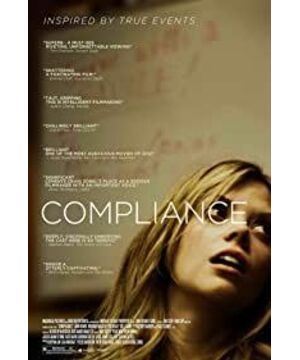The movie that annoys me the most in 2019 is "Obey", which is hardly a story worth telling, barely a story worth telling. Why is it worth talking about but not filming. Because the movie it needs to put energy and emotion to watch. I'm giving a very, very, very, very, very, very, very, very, very, very, very, very, very, very, very, very, very, very, very, very tragic tragedies if I can. In other words, not all real events are worth photographing for the public. Because the world is so big, it is full of wonders. Of course, you can also say that you are curious, but the story itself really lacks thought-provoking meaning. It is simply too low-level, too lacking in generality or so-called teaching. The barrage is dissatisfied. . . Then start from the beginning: A false alarm calls a customer that she is stealing money and that a supervisor is testifying. Where is the supervisor? Plainclothes police? Where is the evidence? After that, the pseudo-police said that they would come over later, but why did they keep talking on the phone? In addition, many words are not like what a normal policeman can say. Did she not notice it at all? How does the other person describe how I look? I face so many people every day at the cash register, and many other people know what I look like for various reasons. What's so strange. Maybe a prank?
Anyway, I really didn't steal. According to normal instinct, the heroine's psychology should be: you online policeman insists that I stole like a talk show (then it doesn't matter if you are wrong or why) Shouldn't you be in a hurry to let them Come and confront me? Later, it was true that the heroine's brother was selling drugs or something to strengthen the deterrence. The problem is that these are all for later. Some barrages say that if this happens to you, it will be like the heroine. It happened that I said not long after the broadcast that some people will indeed get confused when this happens (in fact, the first impression of more people is that they have made a mistake or made no sense or care about it. Anyway, isn't it inexplicable. Acquaintances and me Are you kidding? Or what? Your policeman said I stole money from customers. Come over and let's find out on the spot) No matter if you are guilty or not, you should have reacted in at least a few minutes (I think most people will actually suspect spoofing at the beginning. or pure malice) I'm not saying that the heroine should know what happened minutes after the incident, but that she should know (or roughly know) how to deal with it afterward. No matter how slow and timid you are, you can still be dominated after a period of time when you are treated so absurdly and so unreasonably. Because it seems that the heroine has collapsed? In fact, I don't think she has collapsed. Of course she is frightened, of course confused and suspicious, but has she really collapsed? Why is it more normal to deal with colleagues and acquaintances? At least debated with her (him)? 100% crash? That's the end of the fraud case. There are so many doubts in the process, how can there be no vigilance or resistance. Of course, the heroine is only 19 years old after all, so she is barely able to count. The manager is in his 40s, and he is still a supervisor. . . After the fake police used the foolish manager to get her to control the cashier, who is also the heroine, the fraud entered the second stage: it was nothing more than various searches, and even went to her brother's house to deal with life and death without honoring the scene. As we all know, the telephone as an instant + remote communication tool is also a natural means of investigation, but it is an exaggeration for you to use this to investigate and solve the case throughout the whole process. Isn't it strange that these employees are not at all? The authorities are too confused. Even if the other party represents law enforcement, it has to be justified. Is it okay to convey all kinds of excessive and unconscionable coercive orders on your wires? When faced with various types of law enforcement at the scene, the suspect still has certain personal rights and right to question. In general, I think that in the whole so-called theft incident, the search was not established from the beginning. If a normal person is called by the so-called police to accuse theft, they will suspect that a friend is playing a prank and then suspect that something is wrong. step back No matter how timid and confused, at least a few minutes of shock + confusion should reveal many problems and loopholes. At the end of the interview, the heroine said that she only knew that she had to do what the pseudo-police said. However, what is our generally accepted obedience? Isn't it that the subordinate obeys the superior, the minority obeys the majority, and at most it extends to the layman obeying the expert? Simplifying it to something like - when my superior asked me to do a bad thing and I hesitated to obey the order - would have greater value for discussion. The supervisor finally argued that the man on the phone said he was a police officer. . . This is baseless, and I have never contacted him before. He called him and said he was a policeman. Do you believe it? You still believe in the various unreasonable out-of-bounds orders that follow. . . ? It is said that there are two preconditions for the widespread formation of such fraud cases: First, the United States in the 1950s and 1960s (the rule of law is incomplete, at least not deeply rooted in the hearts of the people), but the background of this film is obviously in the 1990s. Second, in the 1990s, it happened in backward authoritarian countries, such as Latin America or the less developed regions of Asia and Africa, but it did happen in the United States. And it's far more than just together, and I really said it's amazing. Returning to the topic, although the title of the film is called Obedience, the content is still about believing and not believing. The manager didn't trust the clerk who got along with him day and night, but he believed in the online police who had never met. Of course, it can be said that the police's identity is special and even coercive. But everything is still too easy, even without confirming the identity of the police officer of the other party, just believe everything he said? The heroine also believes in each other in various ways. What she doesn't believe is that she has done this kind of thing herself. Contradictory pro, clearly knowing that he has never done this, knowing that it is very strange, why are you still being slaughtered. The key is that there are so many things that are wrong, why do you never doubt your identity as a fake police officer? In fact, many movies talk about mutual suspicion - lack of trust, and here it is the other way around, showing too much trust (although according to the director's meaning, it is forced to be forced by law enforcement...) and it is not ignorant (I still appreciate it or moved by the foolish and loyal) and too honest nature. Are they so stupid? (Not true) Confused by the raid? (Isn't it fooled by this level of surprise? And all the way down?) My final conclusion, of course, is that she (he) lost their minds, but my final confusion is: a bunch of people with at least a normal IQ, why are they because of one The incomprehensible performance of the online pseudo-police is almost collectively insane? The director believes that all attributions are subject to obedience, and I disagree. A bunch of people with at least normal IQs, why have they lost their minds almost collectively because of the unbelievably perfect performance of an online fake police officer? The director believes that all attributions are subject to obedience, and I disagree.
View more about Compliance reviews











